安装redis
将redis上传到服务器
解压
tar zxvf redis-5.0.5.tar.gz
因为redis是用C写的所以要安装c依赖
yum -y install gcc-c++ autoconf automake
进入解压目录执行
cd redis-5.0.5
make
创建安装目录
mkdir -p /usr/local/redis
指定安装路径 否则会默认安装到/usr/local/bin目录下
make PREFIX=/usr/local/redis/ install
进入目录/usr/local/redis/bin下
redis-cli :客户端
redis-server :服务器端
启动
./redis-server
Ctrl+c 结束
修改为后台启动
进入redis-5.0.5文件下将redis.conf复制到/usr/local/redis/bin/文件下
cp redis.conf /usr/local/redis/bin/
修改redis.conf
# 将 daemonize 修改为yes
daemonize yes
# 注释掉 bind 127.0.0.1 可以使所有的ip访问redis,若是想指定多个ip访问,但并不是全部的ip 访问,可以bind设置
# bind 127.0.0.1
# 关闭保护模式,修改为no
protected-mode no
# 添加访问认证
requirepass root
杀死进程
[root@kerwin bin]# ps -ef | grep redis
root 11720 1 0 19:28 ? 00:00:01 ./redis-server 127.0.0.1:6379
root 12213 7322 0 19:40 pts/0 00:00:00 grep --color=auto redis
[root@kerwin bin]# kill -9 11720
[root@kerwin bin]# ps -ef | grep redis
进入/usr/local/redis/bin/下 启动时指定启动文件
./redis-server ./redis.conf
进入已启动的
./redis-cli -p 6379 无密码
./redis-cli -p 6379 -a root 有密码
| systemctl status firewalld.service | 查看防火墙状态 |
|---|---|
| systemctl stop firewalld.service | 临时停止firewall |
| systemctl disable firewalld.service | 禁止firewall开机启动 |
读写分离
创建一个新的目录 redis-48 在此目录下创建三个文件
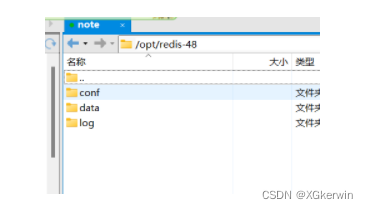
找到redis解压的原文件
复制redis.conf 并重命名 redis-common.conf
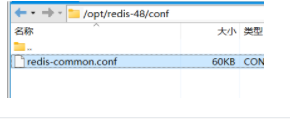
# IF YOU ARE SURE YOU WANT YOUR INSTANCE TO LISTEN TO ALL THE INTERFACES
# JUST COMMENT THE FOLLOWING LINE.
# ~~~~~~~~~~~~~~~~~~~~~~~~~~~~~~~~~~~~~~~~~~~~~~~~~~~~~~~~~~~~~~~~~~~~~~~~
# bind 127.0.0.1 注释掉 bind 127.0.0.1
################################# GENERAL #####################################
# By default Redis does not run as a daemon. Use 'yes' if you need it.
# Note that Redis will write a pid file in /var/run/redis.pid when daemonized.
daemonize yes # 修改为后台启动 改成yes
# By default protected mode is enabled. You should disable it only if
# you are sure you want clients from other hosts to connect to Redis
# even if no authentication is configured, nor a specific set of interfaces
# are explicitly listed using the "bind" directive.
protected-mode no # 关闭保护模式 改成no
# Accept connections on the specified port, default is 6379 (IANA #815344).
# If port 0 is specified Redis will not listen on a TCP socket.
# port 6379 # 注释公共配置端口
# Creating a pid file is best effort: if Redis is not able to create it
# nothing bad happens, the server will start and run normally.
# pidfile /var/run/redis_6379.pid # 注释进程编号记录文件
# Specify the log file name. Also the empty string can be used to force
# Redis to log on the standard output. Note that if you use standard
# output for logging but daemonize, logs will be sent to /dev/null
# logfile "" # 注释公共配置日志文件
# The filename where to dump the DB
# dbfilename dump.rdb # 注释公共配置数据文件
# Note that you must specify a directory here, not a file name.
dir /opt/redis-48/data # 修改数据文件路径
# If the master is password protected (using the "requirepass" configuration
# directive below) it is possible to tell the replica to authenticate before
# starting the replication synchronization process, otherwise the master will
# refuse the replica request.
#
masterauth root # 添加从服务器访问主服务器认证改成root
# Warning: since Redis is pretty fast an outside user can try up to
# 150k passwords per second against a good box. This means that you should
# use a very strong password otherwise it will be very easy to break.
#
requirepass root # 添加访问认证改成root
# AOF and RDB persistence can be enabled at the same time without problems.
# If the AOF is enabled on startup Redis will load the AOF, that is the file
# with the better durability guarantees.
#
# Please check http://redis.io/topics/persistence for more information.
appendonly no # 改成no 根据需求配置是否打开追加文件选项
# Note: read only replicas are not designed to be exposed to untrusted clients
# on the internet. It's just a protection layer against misuse of the instance.
# Still a read only replica exports by default all the administrative commands
# such as CONFIG, DEBUG, and so forth. To a limited extent you can improve
# security of read only replicas using 'rename-command' to shadow all the
# administrative / dangerous commands.
slave-read-only yes # 服务器只读不允许写 把replica-read-only yes 改成
# appendfilename和dir组合使用,找dir(/opt/redis-48/data)路径生成数据文
appendfilename "appendonly.aof"
创建3个conf文件
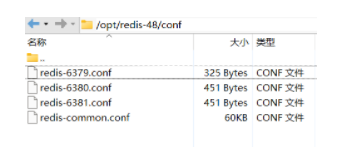
#引用公共配置
include /opt/redis-48/conf/redis-common.conf
#进程编号记录文件
pidfile /var/run/redis-6379.pid
#进程端口号
port 6379
#日志记录文件
logfile "/opt/redis-48/log/redis-6379.log"
#数据记录文件
dbfilename dump-6379.rdb
#追加文件名称
appendfilename "appendonly-6379.aof"
#引用公共配置
include /opt/redis-48/conf/redis-common.conf
#进程编号记录文件
pidfile /var/run/redis-6380.pid
#进程端口号
port 6380
#日志记录文件
logfile "/opt/redis-48/log/redis-6380.log"
#数据记录文件
dbfilename dump-6380.rdb
#追加文件名称
appendfilename "appendonly-6380.aof"
#下面的配置无需在6379里配置
#备份服务器从属于6379推荐配置配局域网IP
slaveof 192.168.72.101 6379
#引用公共配置
include /opt/redis-48/conf/redis-common.conf
#进程编号记录文件
pidfile /var/run/redis-6381.pid
#进程端口号
port 6381
#日志记录文件
logfile "/opt/redis-48/log/redis-6381.log"
#数据记录文件
dbfilename dump-6381.rdb
#追加文件名称
appendfilename "appendonly-6381.aof"
#下面的配置无需在6379里配置
#备份服务器从属于6379推荐配置配局域网IP
slaveof 192.168.72.101 6379
在/usr/local/redis/bin下启动
./redis-server /opt/redis-48/conf/redis-6379.conf
服务启动后连接 密码root
./redis-cli -p 6381 -a root
只能在6379端口写入 剩下的两个只有读没有写
主备切换
从redis解压后的文件下复制 sentinel.conf 至/opt/redis-48/conf下并重命名为 sentinel-common.conf
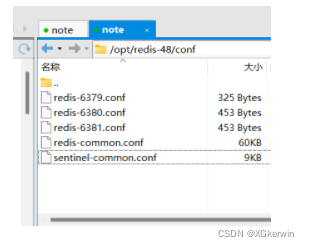
编辑 sentinel-common.conf
# port <sentinel-port>
# The port that this sentinel instance will run on
# port 26379 # 注释哨兵监听进程端口号
# Note: master name should not include special characters or spaces.
# The valid charset is A-z 0-9 and the three characters ".-_".
sentinel monitor mymaster 192.168.72.101 6379 2 # 改为局域网ip 哨兵判断6379下线至少2个同意
sentinel auth-pass mymaster root # 设置master和slaves的密码
# sentinel down-after-milliseconds <master-name> <milliseconds>
#
# Number of milliseconds the master (or any attached replica or sentinel) should
# be unreachable (as in, not acceptable reply to PING, continuously, for the
# specified period) in order to consider it in S_DOWN state (Subjectively
# Down).
#
# Default is 30 seconds.
sentinel down-after-milliseconds mymaster 10000 # 认为服务器已经断线所需的毫秒数 为了更快看到效果设置为10秒
sentinel failover-timeout mymaster 180000 #若 sentinel 在该配置值内未能完成 failover 操作(即故障时master/slave自动切换),则认为本次 failover 失败。
protected-mode no # 关闭保护模式 修改为no
daemonize yes #改为后台启动
添加3个哨兵的私有配置文件
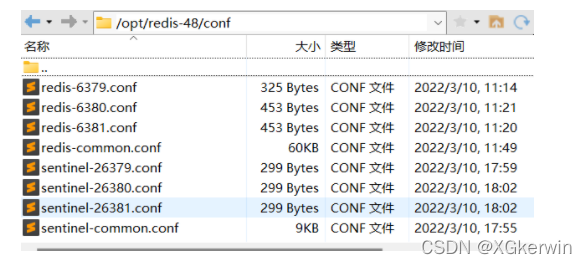
sentinel-26379.conf
#引用公共配置
include /opt/redis-48/conf/sentinel-common.conf
#进程端口号
port 26379
#进程编号记录文件
pidfile /var/run/sentinel-26379.pid
#日志记录文件(为了方便查看日志,先注释掉,搭好环境后再打开)
logfile "/opt/redis-48/log/sentinel-26379.log"
sentinel-26380.conf
#引用公共配置
include /opt/redis-48/conf/sentinel-common.conf
#进程端口号
port 26380
#进程编号记录文件
pidfile /var/run/sentinel-26380.pid
#日志记录文件(为了方便查看日志,先注释掉,搭好环境后再打开)
logfile "/opt/redis-48/log/sentinel-26380.log"
sentinel-26381.conf
#引用公共配置
include /opt/redis-48/conf/sentinel-common.conf
#进程端口号
port 26381
#进程编号记录文件
pidfile /var/run/sentinel-26381.pid
#日志记录文件(为了方便查看日志,先注释掉,搭好环境后再打开)
logfile "/opt/redis-48/log/sentinel-26381.log"
进入/usr/local/redis/bin 目录下启动
./redis-server /opt/redis-48/conf/redis-6379.conf
./redis-server /opt/redis-48/conf/redis-6380.conf
./redis-server /opt/redis-48/conf/redis-6381.conf
[root@kerwin bin]# ps -ef|grep redis
root 7466 1 0 09:35 ? 00:00:04 ./redis-server *:6379
root 7471 1 0 09:35 ? 00:00:04 ./redis-server *:6380
root 7477 1 0 09:35 ? 00:00:04 ./redis-server *:6381
root 7545 7373 0 10:33 pts/0 00:00:00 grep --color=auto redis
[root@kerwin bin]# ./redis-cli -p 6379 -a root
Warning: Using a password with '-a' or '-u' option on the command line interface may not be safe.
127.0.0.1:6379> info replication
# Replication
role:master
connected_slaves:2
slave0:ip=192.168.72.101,port=6380,state=online,offset=4928,lag=0
slave1:ip=192.168.72.101,port=6381,state=online,offset=4914,lag=1
master_replid:e35034e3908d96d72965dfa478e5d8f04a140c48
master_replid2:0000000000000000000000000000000000000000
master_repl_offset:4928
second_repl_offset:-1
repl_backlog_active:1
repl_backlog_size:1048576
repl_backlog_first_byte_offset:1
repl_backlog_histlen:4928
# 查看6380
[root@kerwin bin]# ./redis-cli -p 6380 -a root
Warning: Using a password with '-a' or '-u' option on the command line interface may not be safe.
127.0.0.1:6380> info replication
# Replication
role:slave
master_host:192.168.72.101
master_port:6379
master_link_status:up
master_last_io_seconds_ago:9
master_sync_in_progress:0
slave_repl_offset:5138
slave_priority:100
slave_read_only:1
connected_slaves:0
master_replid:e35034e3908d96d72965dfa478e5d8f04a140c48
master_replid2:0000000000000000000000000000000000000000
master_repl_offset:5138
second_repl_offset:-1
repl_backlog_active:1
repl_backlog_size:1048576
repl_backlog_first_byte_offset:1
repl_backlog_histlen:5138
进入
./redis-cli -p 6379 -a root
查看角色
127.0.0.1:6379> info replication
启动哨兵
[root@kerwin bin]# ./redis-sentinel /opt/redis-48/conf/sentinel-26379.conf
[root@kerwin bin]# ./redis-sentinel /opt/redis-48/conf/sentinel-26380.conf
[root@kerwin bin]# ./redis-sentinel /opt/redis-48/conf/sentinel-26381.conf
查看进程 会有三个哨兵3个redis 相当于启了6太服务器
ps -ef|grep redis
当6379关闭后 10秒以后检测不到6379会6380和6381进行投票,胜出的就可以写数据了
当6379重新启动时6379只能读不能写,还有由6380和6381胜出的进行写。
当6380和6381胜出的也关闭了,写入全还是回归于6379端口
使用服务器对接
配置文件
spring:
redis:
# redis 服务器地址
host: 192.168.72.101
# redis 服务器端口
port: 6379
# 密码
password: root
# 选择哪个库,默认0库
database: 0
# 连接超时时间
timeout: 10000ms
lettuce:
pool:
max-active: 1024 # 最大连接数,默认8
max-idle: 200 # 最大空闲连接,默认8
max-wait: 10000ms # 最大连接阻塞等待时间,单位毫秒,默认-1ms
min-idle: 5 # 最小空闲连接,默认0
sentinel:
master: mymaster
nodes: 192.168.72.101:26379,192.168.10.101:26380,192.168.72.101:26381
@Configuration
public class RedisConfig {
/**
* 获取yml中的属性
*/
//服务器地址
@Value("${spring.redis.host}")
private String host;
//端口
@Value("${spring.redis.port}")
private int port;
//密码
@Value("${spring.redis.password}")
private String password;
//超时时间
@Value("${spring.redis.timeout}")
private String timeout;
//最大连接数
@Value("${spring.redis.lettuce.pool.max-active}")
private int maxTotal;
//最大连接阻塞等待时间
@Value("${spring.redis.lettuce.pool.max-wait}")
private String maxWaitMillis;
//最大空闲连接
@Value("${spring.redis.lettuce.pool.max-idle}")
private int maxIdle;
//最小空闲连接
@Value("${spring.redis.lettuce.pool.min-idle}")
private int minIdle;
@Bean
public JedisPool redisPoolFactory() {
JedisPoolConfig jedisPoolConfig = new JedisPoolConfig();
JedisPool jedisPool = new JedisPool(jedisPoolConfig, host, port, Integer.parseInt(timeout.substring(0, timeout.length() - 2)), password); //如果有密码在后面加上密码
return jedisPool;
}
@Bean
@SuppressWarnings("all")
public RedisTemplate<String, Object> redisTemplate(RedisConnectionFactory factory) {
// 为了自己方便 一般直接使用 String Object类型
RedisTemplate<String, Object> template = new RedisTemplate<>();
template.setConnectionFactory(factory);
// Json 序列化配置
Jackson2JsonRedisSerializer<Object> jackson2JsonRedisSerializer = new Jackson2JsonRedisSerializer(Object.class);
// 使用ObjectMapper转义
ObjectMapper om = new ObjectMapper();
om.setVisibility(PropertyAccessor.ALL, JsonAutoDetect.Visibility.ANY);
om.enableDefaultTyping(ObjectMapper.DefaultTyping.NON_FINAL);
jackson2JsonRedisSerializer.setObjectMapper(om);
// string 的序列化
StringRedisSerializer stringRedisSerializer = new StringRedisSerializer();
// key 采用string的序列化方式
template.setKeySerializer(stringRedisSerializer);
// hash 的key也采用 string 的序列化方式
template.setHashKeySerializer(stringRedisSerializer);
// value 序列化方式采用jackson
template.setValueSerializer(jackson2JsonRedisSerializer);
// hash 的序列化方式采用jackson
template.setHashValueSerializer(jackson2JsonRedisSerializer);
template.afterPropertiesSet();
return template;
}
}
@Resource
private RedisTemplate<Object, Object> redisTemplate;
/**
* 测试连接完成后关闭
*/
@Test
public void test01() {
redisTemplate.opsForValue().set("2223","5555");
}





















 4805
4805

 被折叠的 条评论
为什么被折叠?
被折叠的 条评论
为什么被折叠?








